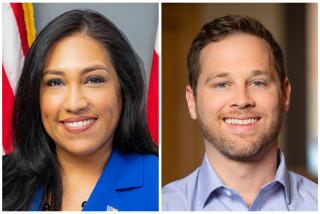Race for Kuehl’s Seat Pits Money, Name Recognition
- Share via
The Democratic primary for the 41st Assembly District is shaping up to be one of the quirkier of the season, pitting a nationally respected manager of a public agency who moved here two years ago against three established, home-grown public servants with state-level ambitions.
Four Democrats, two Republicans and a Libertarian are scrambling for the seat being vacated by Assemblywoman Sheila Kuehl (D-Santa Monica), who is running for the state Senate.
In the March 7 Democratic contest--in which all four candidates declare education to be the priority--the race may boil down to the strength of local loyalty at the polls and, of course, money.
David Freeman, 74, a Tennessee native who is on leave from his post heading the Los Angeles Department of Water and Power, is running against die-hard environmentalist, Agoura Hills founder and teacher Fran Pavley; Latino activist and former Santa Monica City Councilman Tony Vazquez; and a three-term board member of the Santa Monica-Malibu Unified School District, Brenda Gottfried.
The Assembly district, which includes the wealthy beach communities of Santa Monica, Pacific Palisades and Malibu and straddles the Santa Monica Mountains to include Calabasas, Agoura Hills and part of Woodland Hills, has been safely Democratic for the past two decades.
But observers say the well-funded GOP front-runner could offer the Democratic primary winner some competition in November. Of the 241,556 registered voters in the district, 48% are Democrats. Kuehl won with 63% of the vote in 1998.
On the Republican side, Jayne Murphy Shapiro, a wealthy child-safety advocate who supports abortion rights and who has lent her own campaign $276,000 so far, is running against elementary school teacher Stefan Stitch. Libertarian Colin S. Goldman, a management consultant, is running unopposed.
Political observers say the question in the Democratic primary is this: Can anyone raise the funds necessary to defeat Freeman, who has rich, well-connected friends throughout the state and across the country.
“I think he is the handpicked candidate of the Democratic establishment in Sacramento,” said political consultant Rick Taylor. “You’ve got to have money to communicate your message, and none of the other candidates will have that in sufficient measure.”
Freeman was recruited by Los Angeles Mayor Richard Riordan in 1997 and summoned to California to attempt a radical restructuring of the DWP.
His move West followed half a century in the public power and water sector, including stints as head of the Tennessee Valley Authority, the Sacramento Municipal Utility District and the New York Power Authority.
The bushy browed manager, who council members say turns up at meetings in cowboy hat and boots, said his priority is education. The school system--which he likens to a factory with good raw materials and a bad final product--needs to be overhauled, he said. The key to improving education, he said, is to lure quality teachers with better pay, followed by steady pay increases of 5%-10% a year.
“My blood boils when I read in the L.A. Times that prison guards are making more than teachers,” he said. “The other side of me is: I know what a budget is, and I know how to cut costs.”
Freeman also promised to bring his skills managing billion-dollar budgets and his rare expertise on the energy industry to Sacramento.
Distancing herself from Freeman--whom she considers a Johnny-come-lately--Pavley, 50, reminds voters at every opportunity that she was born and raised in the San Fernando Valley.
Pavley teaches eighth grade in the Moorpark Unified School District and was one of the founders of Agoura Hills, where she has served on the City Council for 16 years. The environmentalist also is a California coastal commissioner who has worked on issues such as storm-water pollution and cleaning up Santa Monica Bay.
Like Freeman, Pavley’s top concern is education. She said she would focus on recruitment and retention of teachers, and aims to increase teacher training.
She called for expansion of preschool education with a state master plan.
Pavley is a longtime activist who thinks her time has come.
“The same issues I have cared about for years and years are now the top issues in California,” she said.
Vazquez also started out as a teacher. The soft-spoken native Westsider believes that his reputation in Santa Monica, where 40% of the Assembly district’s population is, will work to his advantage.
After losing his Santa Monica City Council reelection bid in 1994, Vazquez, 44, worked at the San Fernando chapter of United Way. He then served as former Los Angeles Councilman Richard Alarcon’s field director. Vazquez has tutored in schools and helped parents and families learn to read.
Like his competitors, Vazquez said his main issue is education, closely followed by health care. The schools need more money per student and he wants to use the state surplus to create incentives to challenge school districts to match funds locally, he said.
Gottfried also started out in public schools, teaching in South-Central Los Angeles. Her school platform has been quality education for every child and that remains her top priority, she said.
Child care for working mothers, transportation and health care also are concerns.
“I’m really interested in issues that affect women and children and seniors,” Gottfried said.
Pavley, who has been endorsed by United Teachers-Los Angeles and the Sierra Club, and Vazquez, who has the support of the legislative Latino Caucus, as well as most labor organizations, say that Freeman is an outsider whose lack of local knowledge becomes painfully apparent at community forums.
Freeman said the issue has never come up.
“If all they can say is I ain’t been here forever, I think I look pretty good,” Freeman said. “I’m not some Hillary who just moved here to run. I’ve lived here for a while.”
Freeman leads in overall fund-raising with $165,000. Pavley comes closest, with $83,000, of which $30,000 is in loans.
The bulk of Freeman’s contributions are large checks from outside the Los Angeles area, including a $10,000 check from the International Brotherhood of Electrical Workers in Washington, D.C., and a $25,000 check from the head of AES Corp. in Arlington, Va. Pavley points out that her support is local, with 90% of her contributions in small, Los Angeles-area checks.
Freeman said that where he raises money isn’t relevant.
Against Freeman’s big campaign chest, his opponents are scrambling to pound on doors, attend coffees and play up their local roots.
Vazquez--who spends several hours daily walking precincts--remains confident that face time will pay off at the polls.
“I think it’s going to come down to who can reach more voters,” Vazquez said. “People are going to get inundated with mail. Where you win this race is on the ground.”
Although widely seen as a strong Democratic district, one of two Republicans in the race, Shapiro of Encino, is viewed as likely to run a strong general election campaign if she beats Stitch for the GOP nomination. Shapiro heads the nationwide nonprofit child advocacy group Kid Safe and helped pass Megan’s Law, the sex-offender registration law.
Shapiro also hopes to focus on education issues, working to raise teacher pay and increase the number of charter schools.
With Freeman at such a financial advantage, public affairs consultant Howard Sunkin agreed that the Democratic race is his to lose, but does not discount the power of Pavley’s strong grass-roots following.
“Pavley’s got good name recognition,” he said. “I think it’s going to be very close.”
More to Read
Get the L.A. Times Politics newsletter
Deeply reported insights into legislation, politics and policy from Sacramento, Washington and beyond. In your inbox twice per week.
You may occasionally receive promotional content from the Los Angeles Times.









